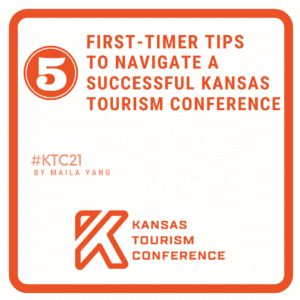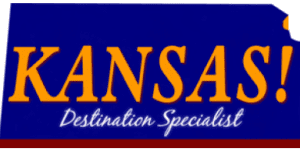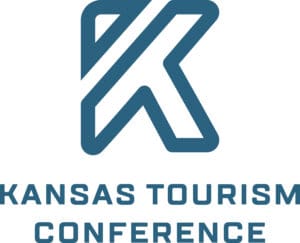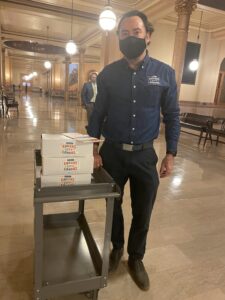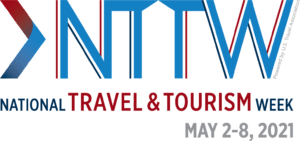Weekly Legislative Report: First Adjournment
April 6-9, 2021
The Kansas Legislature adjourned the 2021 regular session last Friday evening after a very busy week of conference committees and floor debate. From taxes and budget to guns and elections, lawmakers wrapped up most of the larger items on this year’s agenda. The omnibus budget bill, education finance, and any veto overrides are essentially what is left when they return for the veto session on May 3.
Below are highlights from this past week, as well as where several key bills stand right now.
Education
Senate Bill 175 passed the House last week but failed twice to pass the Senate floor. The bill makes appropriations to the Kansas Department of Education for the next two school years for K-12 education. The main objection, however, is a provision that expands the tax credit for low-income student’s scholarship program. The provision is seen by many as directing money away from public schools and toward non-accredited private schools.
The conference committee report would also require in-person instruction, allow for only 240 remote learning hours in a school year, and provide a different calculation for school finance during remote learning. It also reauthorizes the 20-mill property tax levy for schools. This is one of the issues that legislators will have to take up again during the veto session.
House Bill 2039 passed both the House and the Senate and will be presented to the Governor for her signature. The bill requires high school students to take, but not pass, a civics test prior to graduation. A report will be developed by the Kansas Board of Education on student’s achievement on these tests. The bill also amends the law regarding personal financial literacy education for grades 11 and 12, including a personal financial literacy course in either saving and investing; credit and debt; financial responsibility and money management; and insurance, risk management, and income.
Guns
Similar to passed sessions gun legislation was debated by both chambers. House Bill 2058 lowers the age for obtaining a conceal carry license from 21 years to 18 and allows reciprocity to recognize out-of-state licenses to carry a concealed handgun.
House Bill 2089 requires firearms safety be taught in public schools, grades K-12. The State Board of Education is directed to establish curriculum guidelines for a standardized firearm safety education program, which is required to include accident prevention. Both bills passed the Legislature last week and may be subject to a Governor’s veto.
Voting Laws
In an effort to address potential voter fraud, the Kansas Legislature considered two key voting reform measures last week, but only passed one. They are as follows:
House Bill 2183 passed the Legislature last week and is on its way to the governor’s desk. The conference committee report would limit the number of advanced ballots delivered on behalf of another voter to 10 ballots in an election. A written statement at time of delivery signed by both the voter and person delivering the ballot would be required. The bill would also prohibit a candidate for office from delivering advance voting ballots on behalf of another voter unless it is an immediate family member. Violations of the legislation would be a class C misdemeanor.
Senate Bill 307 was sent back to the Senate Federal and State Affairs Committee last week for reconsideration due to lack of leadership support. The bill would amend the timeframe to return advance ballots to county election offices. Existing law requires ballots be postmarked on or before election day but still be counted if received by Friday of election week. SB 307 proposes to strike the three-day window and require all ballots be received by the close of polls on election day.
Unemployment Insurance
House and Senate Commerce Committee negotiators spent several days working with KS Department of Labor (KDOL) and the Governor’s office finalizing an agreement on Unemployment Insurance (UI) reform. House Bill 2196 was unanimously adopted by the Legislature last week and it is expected Governor Kelly will sign it.
Specifically, the bill does the following:
- Authorizes an independent audit of the UI trust fund and earmarks up to $500 million of federal coronavirus relief funds toward replenishing the depleted trust fund from fraudulent and improper claims paid during the pandemic;
- Creates the Unemployment Compensation Modernization and Improvement Council to oversee KDOL’s IT modernization infrastructure project;
- Provides for legislative oversight of the modernization project by requiring the Legislative Coordinating Council to approve the final vendor selected to conduct the modernization project;
- Adjusts employer’s surcharge rate tables and holds off surcharge assessments through 2023;
- Requires employer account balance protections to be provided earlier in the calendar year;
- Makes permanent the My Re Employment program aimed at assisting claimants in finding a job after 2 weeks of receiving benefits;
- Extends 26 weeks of benefit eligibility to September 5, 2021;
- Clarifies anyone proven to be the victim of identity theft will not be disqualified from UI benefits;
- Changes 5-year claimant fraud disqualifications to 1 year disqualification for benefits after the first offense with the disqualification clock beginning only after full repayment of fraud is made and any additional offenses disqualifies for 5-years with full repayment of the fraud starting the clock;
- Adjusts thresholds for maximum weekly benefits from 4.5% to 5% statewide unemployment rate; and
- Modifies the shared work program so negative balanced employers may now participate in the program on a limited basis;
Ultimately, the bill assures the archaic Kansas UI system will be modernized and secured to meet both claimant and employer needs as well as provide relief from all the fraud experienced since the pandemic.
Tax Policy
A conference committee report on Senate Bill 47 was signed last Friday and is expected to pass both chambers early in the veto session. The measure includes provisions from several different bills considered this year:
Senate Bill 47 enacts the Taxpayer Protection Act, requiring that paid tax return preparers sign any income tax return and include the preparer’s federal preparer tax identification number on the form. Any failure to do so would subject the preparer to a civil penalty of $50 per return with a maximum of $25,000 in civil penalties per preparer per year.
Senate Bill 71 extends the sunset by three years on an income tax credit for the Pittsburg Port Authority and makes the credit available to all income taxpayers. Current law limits the credit to only corporate income taxpayers. This proposal was supported by Watco Railroad for investments made in short line rail maintenance.
House Bill 2106 extends the filing deadline for corporate income tax returns to one month after the federal due date and removes the tax liability for victims of identity theft on any income fraudulently obtained.
House Bill 2105 increases the number of days a nonresident employee can work in Kansas before being subject to state withholding requirements to 30 days.
House Bill 2237 extends the sunset of the Rural Opportunity Zone program for two years.
Senate Bill 50 was presented to the governor last Tuesday. The bill requires the collection and remittance of certain taxes by marketplace facilitators, amends income tax law regarding fraudulent unemployment benefits, itemized and standard deductions, federal decoupling related to business income, corporation return filing, net operating losses, and the business expensing deduction. Governor Kelly has ten days to either veto, sign, or let the bill become law without her signature. She vetoed a similar bill in 2019, and many are wondering if she will veto SB 50 as well.
Senate Bill 2143 was passed by both the House and Senate and will be presented to the Governor for consideration. The bill includes a number of sales tax changes including a sales tax exemption for the Cereal Palsy Research Foundation, nonprofit integrated care organizations, and friends of Hospice of Jefferson County. The bill also increases the threshold amount for retails to remit sales tax to the Kansas Department of Revenue (KDOR). The Conference Committee also worked with KDOR on several of their forms, clarifying when pre-payment of sales tax was necessary.
House Bill 2104 was presented to the governor last Friday and is awaiting her signature. The property tax bundle bill would amend law related to the list of eligible county appraisers, the qualifications of county and district appraisers, appraisal standards, Board of Tax Appeals (BOTA) administration and membership, property valuation appeals, judicial review of property tax disputes, BOTA membership, and school district budget certification.
The Senate Tax Committee worked last week on a proposal that would reimburse a portion of property taxes paid by a business that loses revenue due to a government shutdown or operation limitation. It’s a bipartisan measure that stalled early last week as several committee members had substantial questions on the legislation. It’s unclear whether or not subject will be picked up again during the veto session.
Economic Development
Senate Bill 65 and Senate Bill 66 were presented to the governor last Tuesday and Senate Bill 124 on Friday. All are awaiting her signature.
SB 65 removes a training requirement for businesses to be eligible for the High-Performance Incentive Program (HPIP) and allows for the transferability of HPIP tax credits. SB 66 extends the sunset for five years for the Angel Investor Tax Credit and increases the tax credit amounts for investments and annual limits. SB 124 reauthorizes and expands the Sales Tax as Revenue (STAR) Bonds program by adding rural development projects for eligibility.
Transgender Sports
Senate Bill 55 passed the Legislature last week and is on its way to the governor’s desk. The bill creates the Fairness in Women’s Sports Act (Act) and requires interscholastic, intercollegiate, intramural, or club athletic sports that are sponsored by public education to be designated based on biological sex. It was argued by proponents of the bill that transgender female athletes have an unfair physical advantage while opponents argued it was solution to a problem that does not exist in Kansas and is discriminatory against transgender Kansans.
This bill is expected to be vetoed by Governor Kelly. The Senate approved the conference committee report 26-11 and the House 76-43, neither of which reflect a 2/3 majority needed for an override.
Workforce Development
Senate Bill 91 passed the House last Thursday, and the Senate is expected to concur early in the veto session. The bill would provide liability protection for businesses, municipalities and educational institutions that participate in high school work-based learning programs by expanding the definition of “school sponsored activities” that are covered under the school’s insurance plan.
House Bill 2064 passed the Legislature last week and is headed to the governor’s desk. The conference committee report establishes the Kansas Promise Scholarship Act, which provides scholarships for students and adults, who have lived in Kansas for two-years and attend an “eligible postsecondary educational institution” such as community and technical colleges.
House Bill 2066 passed the Legislature last week and is headed to the governor’s desk. The conference committee report would shorten the time that a regulatory body is required to issue occupational credentials to military servicemembers or military spouses seeking to establish residency in Kansas and provide for expedited credentialing of non-military prospective residents. The legislature and administration see this expedited process as a way to encourage additional employment and licensure in the state. Several changes were made on the House floor and in the Senate to accommodate licensing board concerns.
Insurance
The Financial Institutions and Insurance conference committee met last week and agreed to a package of four insurance bills. The conference committee report is expected to be taken up when lawmakers return for the veto session. The bills included are:
Senate Bill 29 amends the effective date specified in the Insurance Code for the risk-based capital instructions promulgated by the National Association of Insurance Commissioners for property and casualty and life insurance companies.
Senate Bill 78 updates the NAIC’s credit for reinsurance model law, the insurance holding company act, and codifies the credit for reinsurance model regulation.
House Bill 2380 amends healthcare stabilization fund minimum professional liability insurance coverage requirements and the membership of the fund’s board of governors.
No action was taken on Senate Bill 199, which provides for short-term, limited-duration health plans.
Budget
The budget process cleared a major hurdle last week with the passage of the initial budget bill, House Bill 2007. A number of budget items were approved before they adjourned, however, some items have been deferred to Veto Session in May.
The budget bill also implements a new requirement that all state agencies and contractors to enroll and actively participate in E-verify for verification of employment eligibility of all employees whose employment commences after January 1, 2022.
The higher education budget made progress during regular session. Funding for technical education colleges was approved, as was restoring previous cuts to the State’s universities. Funding for needs-based scholarships will be debated in May.
State employee pay funding will be addressed during Veto Session. That includes pay and possible raises for Judicial Branch employees and judges. Judicial Branch funding, through docket fees, has been greatly impacted by the pandemic. This year, funding for salaries has been made up through State General Funds.
The Board of Indigents Defense Services received additional funding for increased staff and salaries in this budget, as did the pay of nursing care providers. With increased pay, legislators hope that this funding will increase access for these programs and encourage those to keep working in those fields.
The Kansas Highway Patrol (KHP) will receive funding for a new airplane, as well as new radar technology. The newly approved plane will allow KHP to have more than one aircraft in the air in Kansas.
Agri-tourism will receive a funding increase through the Department of Commerce. An additional $100,000 has been approved for this program.
A pilot program that works with women who were victims of human trafficking will get initial funding for one year. In addition, newborn screening will receive increased funding in this round of budgeting.
With K-12 funding and other items deferred to the Omnibus budget in May, legislators will have a heavy lift during Veto Session. Veto Session also brings latest economic estimates for the Kansas economy, as well as April revenue numbers.
Senate Leadership Changes
Senator Gene Sullentrop, R, Wichita, was stripped of his legislative post as Senate Majority Leader on Friday. The 22-4 vote came after additional details of his arrest were made public. Senator Sullentrop arrested for allegedly evading law enforcement and driving under the influence. An election for a new Majority Leader will be held when legislators return for Veto Session on May 3rd.
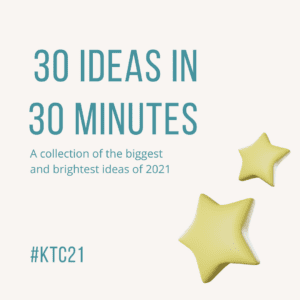 Thanks to everyone for participating in the 30 ideas in 30 minutes session at the Kansas Tourism Conference! A lot of great ideas were shared, and a couple even won a prize! We’ve compiled them all, plus a few from the idea box. Please forgive any errors as it was quite a challenge jotting things down so quickly!
Thanks to everyone for participating in the 30 ideas in 30 minutes session at the Kansas Tourism Conference! A lot of great ideas were shared, and a couple even won a prize! We’ve compiled them all, plus a few from the idea box. Please forgive any errors as it was quite a challenge jotting things down so quickly!